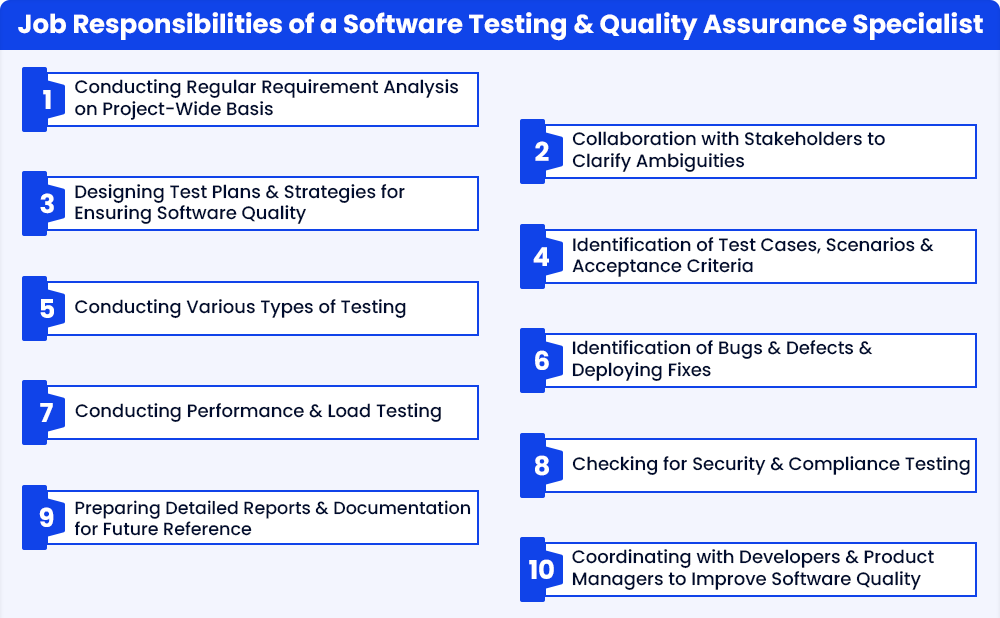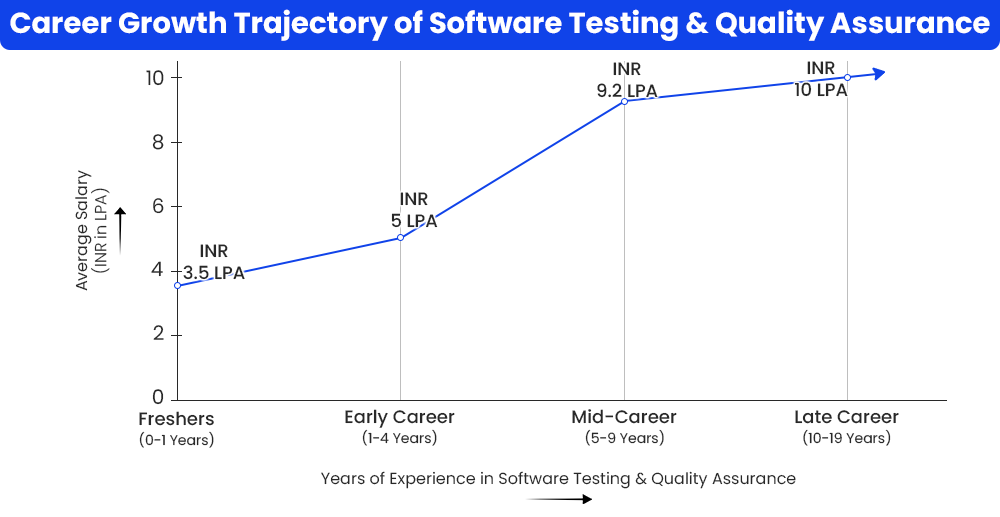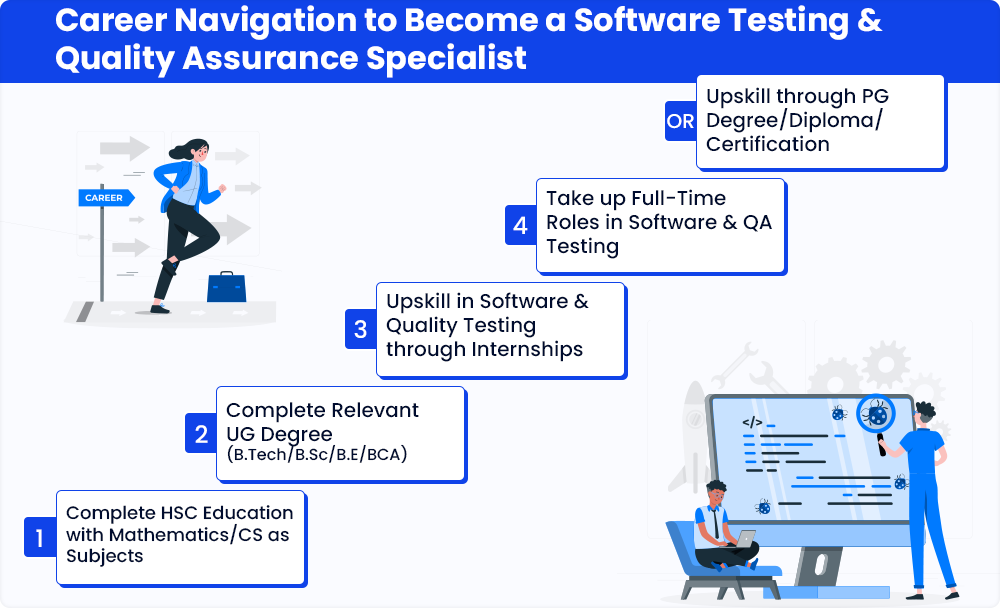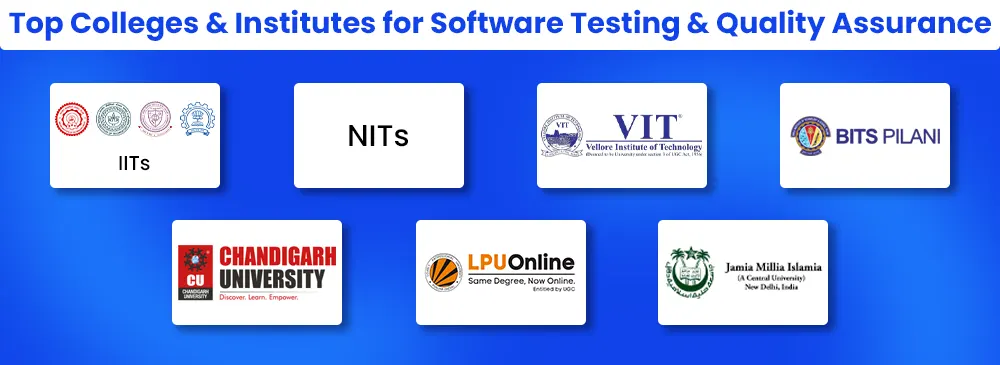Expert Interviews
- University Reviews
- Career Guide
 Video Counseling
Video CounselingImportant Facts
- Ask any Question - CV Forum

How to Start A Career In Software Testing & QA (Guide 2026)
College Vidya Team Jan 23, 2026 1.1K Reads

Software testing specialists, often referred to as quality assurance specialists as well, are IT and CS professionals who play a pivotal role in the development of various software applications. While these professionals are not directly involved in the development of the software, they are central to enhancing its quality, reliability, robustness, and security as a tool. Software testing and quality assurance (QA) are central areas in computer software engineering, and professionals in this career can experience growth and opportunities across a number of industries that rely on the use of software for various purposes. As a career, this domain offers lucrative and prosperous opportunities with significant scope for growth in the future.
In this blog, we outline the career of a software tester and QA specialist in terms of its industrial scope, the courses to pursue to upskill and venture into this field, as well as becoming a software tester and/or QA specialist.
Why Choose a Career in Software Testing & Quality Assurance?
While technological and IT-based careers are quite lucrative in themselves, some domains offer better scope than others. With the vast variety of career options that open up for software testers, one can consider taking up this role for numerous alternatives for specialisation. A few other reasons to consider taking up roles like software testing and QA are listed below.
- Attractive Projected Growth of the Industry: Projected statistics predict that the software testing industry is going to achieve a compound annual growth rate (CAGR) of over 7% from 2021 to 2027.
- Ever-Rising Demand for Trained Professionals: With digital transformation taking industries and the economy by storm, the software testing and quality assurance industry is set to grow further and hence giving rise to a number of job roles.
- Lucrative Compensation: The scope of compensation available in job roles related to software testing and quality assurance (QA) are quite lucrative, and so is the scope for growth with added years of experience.
- Diverse Career Options: Software testing and quality assurance specialists can explore a number of professional roles related to software engineering, development, quality assurance, consulting and so on.
- Global Opportunities: A number of countries across the world including the USA, Canada, Ireland etc. are top hirers of software testers. Overall as well, this career domain has a high demand across the globe.
- Stability Amid Transforming Digital Landscape: As the wave of digital transformation has impacted multiple industries and job roles, the role of software professionals remains a stable constant, making the roles of software testers and quality assurance professionals critical.
Roles & Responsibilities of a Software Testing & Quality Assurance Specialist
The prime job responsibilities of a Software tester and/or QA specialist revolve around enhancing the overall usability and robustness of software applications, including aspects such as assessing security risks and mitigating them, identifying system bugs and fixing them further, collaborating with developers to resolve issues and so on.
The primary job responsibilities of a software tester and/or QA specialist are illustrated below.

Key Skills Needed for Software Testing & Quality Assurance
The knowledge and skills repertoire for a software tester/QA specialist requires strong programming skills, testing skills, penetration testing skills, analytical aptitude, attention to detail and the likes. These are elaborated below.
1. Technical Skills & Knowledge to Succeed as a Software Testing & Quality Assurance Specialist
In this section, we walk you through the core technical skills and knowledge areas important for a tester or QA specialist to possess. Some of these have been illustrated below.
|
Key Skills |
Specifications |
|
Programming & Scripting |
Being proficient in basic programming languages, including the likes of Python, Java, JavaScript, C#, etc. required on to project-to-project basis |
|
Automation Testing |
Being familiar with automation tools such as Selenium, Appium, TestNG, etc., for efficient automation testing. |
|
Performance Testing |
Being adept at analysing the performance of software under load using platforms such as JMeter, LoadRunner, Gatling etc. |
|
Security Testing |
Being well-versed with security vulnerabilities, penetration testing, security testing tools like OWASP ZAP, Burp Suite etc. |
|
Agile & DevOps Methods |
Being familiar with and proficient in working in Agile environments such as Scrum/Kamban, as well as engaging in sprint planning and retrospectives. |
2. Soft Skills to Succeed as a Software Testing & Quality Assurance Specialist
Soft skills, behavioural competencies and overall cognitive aptitude are essential for this domain of software engineering, as testers and QA specialists must be adept in identifying complex as well as minute bugs, system errors, security breach potential and so on.
Some of the important soft and interpersonal skills for software testers and QA specialists are elaborated below.
|
Key Skills |
Specifications |
|
Analytical Skills |
Being able to approach problem statements and test cases from an analytical mindset, breaking down complex bugs into solvable components, and arriving at effective solutions and fixes. |
|
Attention to Detail |
Being minutely attentive to details to spot errors, data patterns, or other nuanced aspects for testing and further improvement. |
|
Communication Skills |
Being adept at communicating issues, insights, and complex technical problems to multiple stakeholders from technical and non-technical backgrounds without excessive complexities. |
|
Adaptability |
Being flexible and agile in one's approach to solving problems, being able to approach problems from multiple perspectives, and identifying effective solutions. |
|
Collaboration & Teamwork |
Communicating regularly with multiple stakeholders, clarifying concerns, and engaging team members to ensure alignment on critical tasks. |
Career Analysis: Scope of Software Testing & Quality Assurance
Before choosing any career option for oneself, it is important to look into the scope of the career concerning available roles and options, the approximate compensation offered for them, the growth trajectory to expect, and so on. These aspects are elaborated herein.
1. Career Opportunities in Software Testing & Quality Assurance
Considering software testers prepare themselves for extensive software testing and quality assurance, several related niche domains about testing open up for them. A few of the most lucrative options that these professionals can explore are mentioned below with their approximate compensation.
|
Career Option |
Average Salary (Per Annum) |
|
Performance Testing Engineer |
INR 7 LPA |
|
Cybersecurity Expert |
INR 8 LPA |
|
Penetration Tester |
INR 6 LPA |
|
Software QA Engineer |
INR 6 LPA |
|
Software Quality Engineer |
INR 6 LPA |
|
Scrum Master (QA Focused) |
INR 12 LPA |
|
Software Developer |
INR 8 LPA |
|
Full Stack QA Developer |
INR 7.5 LPA |
Software testing and quality assurance as a function is core to every software development organisation. As a result, the majority of the technological giants in India and across the world are active recruiters for these roles, making them even more lucrative. Below are some of the eminent companies that hire software testers and QA specialists.
- IBM
- QASource
- Apple
- Microsoft
- Meta Platforms Inc.
- Amazon
- Infosys
2. Career Growth Trajectory of Software Testing & Quality Assurance
Selecting a career does not only require a consideration of its current scope, but also its future potential for growth and career escalation. In software testing and QA, one can expect a decent scope of financial growth with growing years of experience and skills, as illustrated below.

Career Navigator: What Course to Pursue for a Career in Software Testing & Quality Assurance?
To start a career in software testing and/or quality assurance, an aspirant must complete their HSC education from a recognised board, with mathematics or computer science as subjects. Followed by this, they can choose from multiple course options to become a software tester or QA specialist. These include UG courses such as B.E./B.Tech/BCA/B.Sc in a relevant specialisation such as computer science. Further, the aspirant must upskill and prepare themselves in relevant areas of software testing and start exploring professional opportunities through internships or full-time roles.
The overall career navigation chart to venture into this profession is provided below.

There are a number of undergraduate and postgraduate courses available in the specialisation of computer science and software development, which aspirants can consider taking up to venture into this field. In addition, executive courses and online upskilling courses are other options professionals can consider for their skills expansion. Details about some such courses are provided below.
|
Course |
Approximate Fee |
|
B.Tech in Computer Science Engineering (CSE) |
INR 5,00,000 |
|
B.E. in Computer Science Engineering (CSE) |
INR 4,50,000 |
|
INR 45,000 |
|
|
INR 2,25,000 |
|
|
INR 90,000 |
|
|
INR 2,00,000 |
|
|
INR 2,20,000 |
|
|
INR 2,25,000 |
|
|
M.Tech in Computer Science Engineering |
INR 3,00,000 |
Mentioned below are some of the eminent institutions and universities you can consider in India to pursue higher education in software testing, QA, and development. These include renowned public as well as private higher educational institutions.

Conclusion
The career domain of software testing and quality assurance is a suitable career for aspirants and professionals with strong detail orientation, analytical aptitude, and collaborative skills paired with expertise in software development. With lucrative opportunities available in the domain and top technological companies hiring for testers and QA experts, the career presents an appealing scope for a successful vocational journey.
FAQs (Frequently Asked Questions)
A software testing specialist has the role of ensuring and upholding the software quality by doing detailed analysis of bugs and their fixes, verifying fixes, conducting penetration testing to check the security of the software and so on.
On an average, a software tester or quality assurance specialist can make about INR 6 LPA to INR 8 LPA. This figure is likely to grow multifold with further years of experience.
On an average, a quality assurance specialist can earn about INR 7 LPA to INR 9 LPA depending upon their designation, the organisation as well as the years of experience and proficiency they possess.
Some of the top companies that hire software testers include the likes of Apple, Microsoft, IBM, Infosys and so on. Majorly, all technological giants hire software testers for their organisations.
Some of the eminent colleges and institutions in India for education in software testing and development include the IITs, the NITs, VIT Vellore, BITS Pilani etc.

Idea Alchemist / Concept Creator / Insight Generator
We are an online education platform where users can compare 100+ online universities on 30+ X-factors in just 2 minutes. With an active CV community, we have transformed online learning to quite an extent. With the CV Subsidy scheme, we contributing to GER in India while helping our learners with their finances in their “Chuno Apna Sahi” journey!
Every query is essential.
Our team of experts, or experienced individuals, will answer it within 24 hours.
Recommended for you
Tired of dealing with call centers!
Get a professional advisor for Career!
LIFETIME FREE
Rs.1499(Exclusive offer for today)

Pooja
MBA 7 yrs exp

Sarthak
M.Com 4 yrs exp

Kapil Gupta
MCA 5 yrs exp
or



Career Finder
(Career Suitability Test)
Explore and Find out your Most Suitable Career Path. Get Started with our Career Finder Tool Now!
ROI Calculator
Find out the expected salary, costs, and ROI of your chosen online university with our free calculator.
